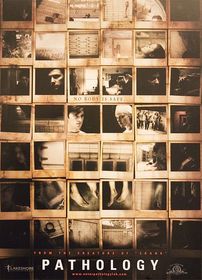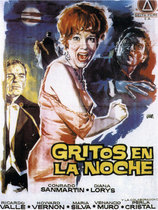Our editor-in-chief Nate Yapp is proud to have contributed to the new book Hidden Horror: A Celebration of 101 Underrated and Overlooked Fright Flicks, edited by Aaron Christensen. Another contributors include Anthony Timpone, B.J. Colangelo, Dave Alexander, Classic-Horror.com's own Robert C. Ring and John W. Bowen. Pick up a copy today from Amazon.com!
Pathology (2008)
Pathology is a solid little thriller that doesn't quite enter the land of horror. That's fine, of course – it doesn't appear to have been specifically tailored as a horror film to begin with. I review it here not because of its genre, but because its subject matter lends itself to easy appreciation by horror aficionados. In brief, Pathology is about how a group of young people turn death into a pastime and a pastime into an obsession. As a person who probably watches dozens of (simulated) murders on a weekly basis and then comments on how well said murders were, ahem, executed, I can sort of relate.
When Dr. Ted Grey (Milo Ventimiglia, “Heroes”) becomes the newest resident at a prestigious forensic pathology lab, his genius-level ability to deduce a person's cause of death from physical evidence causes him to get drawn into a peculiar game played by some of his co-workers and lead by Dr. Jake Gallo (Michael Weston, who takes a certain glee in playing Mephistopheles to Ventimiglia's Faust). These doctors are looking for something more challenging than the corpses they see day-in and day-out – they try to enact the perfect murder. They take turns, each one killing off a random piece of human flotsam in an exceptionally unlikely way and then presenting their work to see if their peers can guess how it was done. Murder, however, begets murder; when Ted decides he doesn't want to play anymore, the group starts to unravel.
The main question raised by the screenplay (written by Mark Neveldine and Brian Taylor) is “What happens when we become too inured with death?” The forensic pathologists in Pathology seem to see more dead people than they do live ones. Furthermore, each cadaver is presented, not as a person who once lived, but as a puzzle to be solved, a challenge to be met. Under those circumstances, it's easy to see how these doctors might lose perspective and start seeing their respect for the dead dwindle to a level reserved for Rubik's Cubes. The possibility is chilling and forms the basis of much of Pathology's watchability.
Director Marc Schoelermann isn't likely to win any awards for originality – filming a dehumanizing metropolis in gun-metal grays is so 1999 – but he keeps the look and pace of the film engaging. He's definitely of the post-MTV generation – there's lots of quick cutting and weird camera tricks – but for the most part, he makes it work. Take the sequence where Ted and his fiancee, Gwen (Alyssa Milano), are making sweet and tender love. Intercuts with this are shots of Jake and his groinbuddy Juliette (Lauren Lee Smith) bumping uglies with a little bloodplay, fisticuffs, and acupuncture mixed in. Schoelermann uses this juxtaposition to demonstrate, without words, the fundamental differences between Ted and Jake, making Ted's decision to discontinue his involvement with the game seem much more natural.
There are a number of flaws in Pathology that range from irritating (excessive scenes of sex and a voyeuristic obsession with showing the assets of Ventimiglia's butt double) to offensive (the majority of the female characters are portrayed as willing to screw anything that moves). However, most problematic of all is the final fifteen minutes as a whole. It begins with an extremely satisfying event that I won't spoil here, except to say that it felt both inevitable and surprising; it would've made a fantastic morally ambiguous ending to the entire movie. Unfortunately, the film continues, stuttering forward without any momentum to really carry it, before finally coming to a different morally ambiguous ending that doesn't make much sense. Very disappointing.
Pathology isn't a great film, but it's a pretty good one. I'll admit that I probably like it more than I should based on my fascination with the moral ambiguities it presents. However, I come to that fascination as a horror fan, so you may very well agree with me. Just ignore the last fifteen minutes, though; they really aren't worth it.








